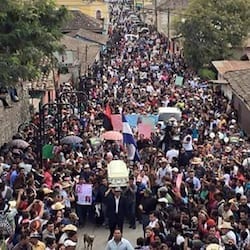Last week’s assassination of Honduran environmental and indigenous rights leader Berta Cáceres has further sullied Honduras’ already tarnished democracy. As co-founder of the Civil Council of Popular and Indigenous Organizations of Honduras (COPINH), Cáceres led a tireless campaign to protect the land and livelihoods of indigenous people living in areas where the Honduran government promotes agro-industrial, tourism, hydroelectric and mining projects. The lack of respect and understanding toward the communities Cáceres represented led to numerous human rights abuses and the paralysis of many development projects.
Last year, Cáceres received the Goldman Environmental Prize — regarded as the “Green Nobel” — in recognition of her work. In November, Cáceres and her friend Miriam Miranda, a leader of the Afro-Indigenous Garifuna community in Honduras, were awarded the Rothko Chapel’s 2015 Oscar Romero Award. At an event leading up to the award ceremony, the Baker Institute’s Latin America Initiative co-sponsored a panel discussion on economic development, environmental protection and indigenous rights in Honduras — the focus of Cáceres and Miranda’s environmental activism.
In Honduras, approximately 30 percent of the country’s land has been earmarked for mining concessions. To provide energy to power future mining operations, the government has approved more than 40 dam projects. This involves privatizing land and granting concessions of rivers, which significantly impact many Lenca communities. After numerous death threats and acts of aggression toward Cáceres and other COPINH members, the Inter-American Commission on Human Rights (IACHR) granted precautionary measures in 2009.
Cáceres actively participated in the defense of the Gualcarque River, construction site of the Agua Zarca hydroelectric dam. This river is an important source of water for several Lenca communities; residents believe the spirits of indigenous girls live there. The river is also cherished as part of the legacy of the Cacique Lempira, who fought the Spaniards for the lands during colonial times.
The Agua Zarca project was originally led by China’s state-owned Sinohydro, the world’s largest dam developer, and the Honduran company Desarrollos Energéticos S.A. (DESA). Cáceres spearheaded a campaign against the dam because the indigenous people affected by the project did not give prior or informed consent. In 2013, Sinohydro withdrew from the project over land conflicts and human rights violations, such as the killing of Tomás García, a COPINH member shot at close range by the army during a peaceful protest.
Acts of aggression and intimidation, as well as threats against the lives of Cáceres and other COPINH members, continued. In an October working meeting between IACHR and a delegation from the Honduran government, IACHR expressed concern over the risks Cáceres continued to face and the inadequate implementation of measures to protect her.
After her death, Cáceres’ mother, daughters and son publicly thanked local and international organizations and communities for their condolences and outpouring of solidarity. They also stated that both DESA, the company behind the hydroelectric project, and the Honduran government, which failed to protect Cáceres and favored DESA’s interests over those of the indigenous people affected by the project, were responsible for the activist’s death. Her murder is still under investigation. Cáceres’ nephew, Silvio Carrillo, is currently in Washington meeting with members of the Congress to discuss her case. He wants the IACHR to launch an investigation into his aunt’s murder, as was done for the 43 Mexican students who disappeared in 2014.
One could argue that blaming Cáceres’ death on the Honduran government and the private companies involved in the Agua Zarca dam is a matter of perception. However, what is beyond opinion is the fact that Honduras has the world’s highest number of female homicides, has the world’s highest murder rate, and is the world’s most dangerous country per capita for environmental activists.
Cáceres knew better than anyone about the dangers she faced. In a statement made in December 2013, she said:
“I want to live. There are many things I still want to do in this world, but I have never once considered giving up fighting for our territory, for a life with dignity, because our fight is legitimate. I take lots of care but in the end, in this country where there is total impunity I am vulnerable … when they want to kill me, they will do it.”
Erika de la Garza is program director of the Latin America Initiative at the Baker Institute.
